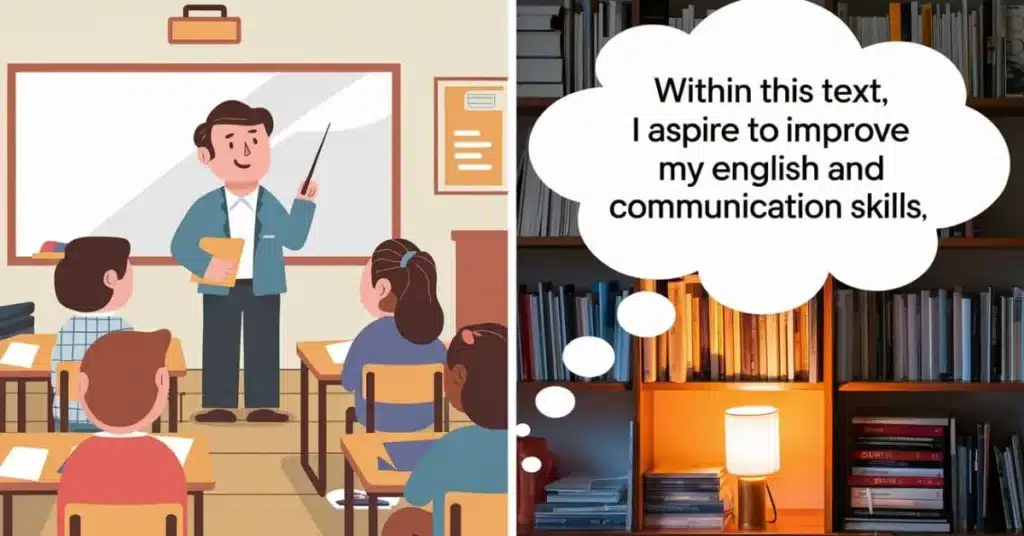
20 Other Ways to Say “In This Essay, I Will” (With Examples)
“In This Essay, I Will is a common phrase that can make your writing sound repetitive. Explore 20 alternative phrases to replace it and elevate your academic writing. Whether you’re crafting an academic paper or engaging in scholarly writing, these alternatives will improve your writing style and strengthen your essay introduction.
By using creative language and varied sentence structures, you can make your essay content more engaging and professional. These alternatives help you avoid clichés while ensuring that your formal writing remains clear, concise, and impactful. Discover how to write more effectively with these alternative phrases.”
Is It Wrong to Say “In This Essay, I Will”?
While it’s not “wrong” to use “In this essay, I will,” the phrase has become a bit overused and can sound dull or formulaic. In many scholarly writing contexts, readers are looking for original phrasing that feels tailored to the topic. Avoiding this cliché is a subtle but impactful way to make your writing stand out.
Using more creative language in your essay introduction shows you’ve given thought to your essay structure and are committed to engaging the reader. By stepping away from “In this essay, I will,” you’re also likely to make a better first impression with instructors or peers, showcasing an advanced writing approach.
What to Say Instead of “In This Essay, I Will”
- The purpose of this essay is to…
- This essay aims to…
- In the following pages, I intend to…
- The goal of this piece is to…
- Throughout this essay, I plan to…
- In this document, my objective is to…
- The focus of this composition will be to…
- Throughout this paper, I intend to…
- The ambition of this work is to…
- Within this text, I aspire to…
- This paper will discuss…
- The following analysis seeks to…
- In exploring this topic, I will…
- The aim of this discussion is to…
- This examination will focus on…
- In this report, I aim to…
- This investigation will cover…
- The scope of this essay includes…
- This exploration intends to…
- My objective in this paper is to…
20 other ways to say “In This Essay, I Will” (With Examples):
Here are 20 other ways to say “In This Essay, I Will” (With Examples):
1. The purpose of this essay is to…

Use this phrase when you want to state your intent clearly and directly. It’s especially useful for formal or academic essays that need a straightforward beginning.
Example:
“The purpose of this essay is to explore the impact of renewable energy policies on urban development in major cities across the United States.”
2. This essay aims to…
This concise option makes your objective crystal clear. It’s suitable for both casual and formal settings, adding a touch of professionalism to your opening.
Example in an Email:
“Dear Professor Jones, This essay aims to analyze three core principles in environmental ethics and how they apply to the challenges we face today.”
3. In the following pages, I intend to…
If your essay requires a bit more introduction, this phrase can help set up a longer discussion or a multi-part exploration.
Example:
“In the following pages, I intend to examine how cultural narratives shape our understanding of historical events and influence modern-day perceptions.”
4. The goal of this piece is to…
This phrase is versatile, perfect for academic or educational writing that requires clarity and precision.
Example in a Research Proposal:
“The goal of this piece is to investigate the relationship between sleep patterns and cognitive performance among college students.”
5. Throughout this essay, I plan to…
Using this phrase helps emphasize that you’ll be tackling several interconnected points throughout your work.
Example:
“Throughout this essay, I plan to evaluate the effects of digital media on young adults’ social skills and communication habits.”
6. In this document, my objective is to…

Ideal for formal or advanced writing, this phrasing is especially helpful in academic papers or projects where your purpose must be clearly articulated.
Example in a Cover Letter:
“In this document, my objective is to highlight my experience in project management and explain how I can contribute to your company’s growth.”
7. The focus of this composition will be to…
If you’re writing a formal essay or a longer piece, this phrase works well to establish your main theme or argument.
Example:
“The focus of this composition will be to discuss the evolution of public art in urban landscapes and its impact on community identity.”
8. Throughout this paper, I intend to…
A classic choice, this phrase is both formal and approachable, suitable for structured academic writing.
Example in a Graduate Thesis:
“Throughout this paper, I intend to analyze the economic implications of blockchain technology in supply chain management.”
9. The ambition of this work is to…
For a more elevated tone, this option adds a sense of purpose and depth to your writing, fitting well in scholarly writing.
Example:
“The ambition of this work is to delve into the complex relationship between political ideologies and environmental policy-making.”
10. Within this text, I aspire to…

If you’re looking for a phrase that conveys a sense of aspiration or vision, this one is ideal for reflective or exploratory essays.
Example in a Personal Essay:
“Within this text, I aspire to share insights into my journey as a writer and the pivotal moments that shaped my creative voice.”
11. This paper will discuss…
This direct, no-nonsense introduction works well for academic essays where you want to clearly state your topic right from the start.
Example:
“This paper will discuss the impact of social media on interpersonal communication among teenagers.”
12. The following analysis seeks to…
This phrasing adds a sense of depth and exploration, suitable for more analytical academic papers.
Example in a Case Study:
“The following analysis seeks to identify the key factors contributing to employee engagement within tech startups.”
13. In exploring this topic, I will…
Ideal for creative language that invites curiosity, this phrase helps set a more thoughtful tone for your essay.
Example:
“In exploring this topic, I will examine how global climate policies influence local environmental practices.”
14. The aim of this discussion is to…
Using this phrase is perfect for essays or papers where you’re presenting multiple perspectives on a topic.
Example in an Opinion Piece:
“The aim of this discussion is to shed light on both the advantages and potential pitfalls of artificial intelligence in daily life.”
15. This examination will focus on…

This alternative is clear and concise, often used in scholarly writing where the focus is on a specific issue or phenomenon.
Example:
“This examination will focus on the effects of urban planning on community health and wellness.”
16. In this report, I aim to…
A versatile phrase, this option works well in educational writing as well as in professional reports or business proposals.
Example in a Project Proposal:
“In this report, I aim to present viable strategies for reducing company costs while maintaining employee satisfaction.”
17. This investigation will cover…
For research-heavy essays, this phrase signals that a thorough and detailed analysis will follow.
Example:
“This investigation will cover the economic, social, and environmental factors affecting water scarcity in developing nations.”
18. The scope of this essay includes…
If you’re tackling a broad topic and need to narrow down specific areas, this phrase works well to set expectations.
Example in a Literature Review:
“The scope of this essay includes an exploration of key themes in American postmodern literature.”
19. This exploration intends to…
This phrasing suits essays that delve into complex or abstract topics, inviting readers to journey through a thoughtful exploration.
Example:
“This exploration intends to delve into the psychological effects of long-term space travel on astronauts.”
20. My objective in this paper is to…

Using “My objective in this paper is to…” adds a personal yet professional touch, fitting for formal writing while still sounding approachable.
Example:
“My objective in this paper is to analyze the effectiveness of online education platforms in comparison to traditional classroom learning.”
Pro Tips
- Hook with a Purpose: Don’t just state your intent; frame it in a way that invites curiosity. For instance, “The purpose of this essay is to uncover surprising insights into…” works well to pique interest.
- Vary Your Openers: Each essay might call for a slightly different tone, so don’t be afraid to mix things up. Choosing the right phrase can enhance your writing style and keep readers engaged.
- Make It Flow: Use transitional phrases to tie your essay introduction smoothly with the body. For example, “The focus of this composition will be…” flows well into a multi-part discussion, while “In this document, my objective is…” suits more straightforward topics.
Frequently Asked Question
Should you say in this essay “I will”? Answer this question
While it’s not incorrect to say “In this essay, I will,” it can sound repetitive and formulaic in many academic essays. In today’s scholarly writing, it’s better to avoid overused phrases like this and opt for more engaging alternatives. By replacing “In this essay, I will,” with phrases like “The purpose of this essay is to…” or “This paper will explore…,” you make your writing style sound more professional and dynamic. This approach adds clarity, helps maintain reader interest, and strengthens your essay structure, allowing you to express your intent more clearly without sounding predictable.
What words can you use instead of “I” in an essay?
In academic writing, it’s often encouraged to avoid overusing the personal pronoun “I” to maintain a formal tone and objectivity. Here are several alternatives you can use instead:
- The author – Commonly used when referring to yourself in academic papers, maintaining formality.
- Example: “The author suggests that…”
- This paper – Focuses on the document itself, not the writer.
- Example: “This paper will explore…”
- We – In some cases, using “we” is acceptable, especially in collaborative or more inclusive writing styles.
- Example: “We will examine the effects of…”
- One – This is an impersonal pronoun, often used in more general discussions.
- Example: “One could argue that…”
- The researcher – Appropriate in research-oriented essays, emphasizing the investigative role.
- Example: “The researcher examines the data…”
- The study – Refers to the research or analysis being discussed.
- Example: “The study finds that…”
- The writer – Similar to “the author,” but can be more casual.
- Example: “The writer contends that…”
- The work – Refers to the piece of writing itself.
- Example: “The work explores several themes…”
How do you introduce what you will be talking about in an essay?
To introduce what you’ll be talking about in an essay, start with a clear thesis statement that outlines your main argument or purpose. Briefly preview the key points you will cover, giving the reader a roadmap of what to expect. This helps set the tone and direction for your essay.
Conclusion
In conclusion, replacing the phrase “In This Essay, I Will” with more dynamic alternatives can significantly enhance the clarity and professionalism of your writing. By using alternative phrases, you can avoid repetition and engage your reader from the very beginning.
Whether you’re working on an academic paper, scholarly writing, or formal writing, these changes can improve your writing style and make your essay introduction more compelling. Embrace these alternatives to present your ideas more effectively, demonstrating your ability to communicate with clarity and confidence throughout your essay content.

Emily Olivia is an experienced writer specializing in grammar and English language topics. With a passion for clarity and precision, she shares valuable insights on synonyms, grammar rules, and writing tips to help readers enhance their language skills on Grammar Path.





